GRAND PRIX EMANUEL FEUERMANN
First international cello competition commemorating Emanuel Feuermann's 100th birthday: November 22, 2002
by Nancy Chapple |
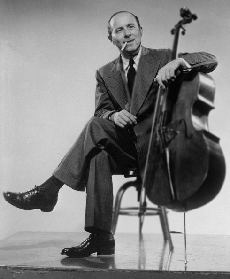
|
Emanuel Feuermann's extraordinarily virtuosic cello-playing first made the cello known to the concert-going public as a solo instrument. They say that Feuermann's range of colors was comparable to the best violinists': he fearlessly climbed the instrument's heights, playing its highest tones with ease and elegance. Accordingly, the listeners had high expectations about the level of expertise of participants in the "Grand Prix Emanuel Feuermann." The event was a great success for all involved: gifted young cellists, interested audience, fair jury decisions.
This competition was held for the first time on the occasion of Emanuel Feuermann's 100th birthday. In the future, it is intended that the competition take place in Berlin every four years. Feuermann was named Germany's youngest professor at Berlin's Conservatory, but he had to leave the city in 1933, as he was forced to resign when the National Socialists seized power. He then immigrated via Switzerland to the US, passing away there in 1941.
Two cello professors, Wolfgang Boettcher of Berlin's University of the Arts (UdK) and Boris Pergamenschikov of Berlin's Hanns-Eisler-Hochschule, initiated the competition. The competition was jointly sponsored by the UdK Berlin and the Kronberg Academy, an institution dedicated to fostering gifted young string players.
A huge poster showed Feuermann at the cello, cigarette hanging out of his mouth; this adorned all publicity material. People talked a lot about his unique virtuosity and his strong musical personality. It is not exaggerated to say that the competition was truly in his tradition.
42 cellists (all born after 1973) submitted videotapes in July 2002 with works by Beethoven, Max Reger, and Popper or Davidoff to qualify for the second round. The eleven international participants in the second round played on two consecutive days; this gave the interested Berlin audience a good opportunity to get to know their musical personalities. The jury included well-known cellists -- Wolfgang Boettcher, Thomas Demenga, David Geringas, Natalia Gutman, Laurence Lesser, Boris Pergamenschikov, Raimund Trenkler -- and was headed up by Bernhard Greenhouse. The decisions on who would participate in the second round seemed well-founded; the level of performance was quite high.
It was intended that participants present 45-50 minutes of pieces they had selected for the second round, but hardly anyone stuck to this timeframe. However, the playing was never interrupted by the jury, typical of the whole competition's quiet and respectful atmosphere. In only a few cases was the cello playing uninteresting, meaning that the approximately 120 listeners heard more than was necessary to discern stylistic range and musical talent.
One particular challenge for the young cellists was Aribert Reimann's Solo II, a mandatory piece composed expressly for the competition. The participants received the score one month beforehand. The piece, 15 pages long and technically challenging, covers the entire range of cello sounds and colors: harmonics, double stops, bowed, pizzicato, pianissimo to fortissimo. The composer himself was present and helped decide which was the best interpretation. The interpretational range was interesting: although several soloists did not seem to enjoy the piece, three made the work their own in a convincing way, spanning an arch from beginning to end: Jing Zhao, Gavriel Lipkind and Boris Andrianov. It was not surprising that these three young cellists also played in the third round: the ability to make music with a completely new work within just four weeks shows great musicality.
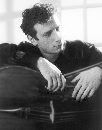
Boris Andrianov
For the last round, the repertoire was fixed: Hindemith's Sonata, Op. 25 Nr. 3, and either the Haydn D Major Concerto or a version of the Mozart flute concerto arranged by George Szell for Feuermann. The three official finalists -- Danjulo Ishizaka, Jing Zhao und Boris Andrianov -- were joined on that evening by László Fenyö and Gavriel Lipkind, competing for the special prize for the best interpretation of the Mozart concerto.
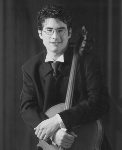
Danjulo Ishizaka
Lipkind has an enormous palette of colors at his disposal and a very personal musical style. Andrianov makes a highly professional impression with each piece; for instance, the second movement of the Mozart concerto was like honey poured over the strings: smooth, warm, uniformly sweet. And Danjulo Ishizaka, only 23? Each of his interpretations provided a musical vision. He had mastered the Haydn concerto in D-major both technically and musically; his cadenzas were breathtakingly beautiful.
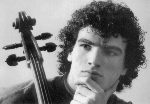
Gavriel Lipkind
Jing Zhao, 24-year old from China, indubitably earned the Special Prize for Promising Young Talents. She communicates a tangible love of playing and has the courage to attempt dynamic extremes; she seems to jump headfirst into each of her pieces in an intoxicatingly musical way. In a short interview she described her musical background and her unusual life story: at the age of 5 she began to learn cello because of her father's love for the instrument; she decided to become a cellist after hearing Yo-Yo Ma in concert when she was 6. After years at a special school in Beijing, a former student of Pierre Fournier took Zhao to Tokyo to study; she was 15. Her current studies in Berlin were made possible by a letter from Seiji Ozawa to Claudio Abbado. She learned a huge amount about interpreting the Shostakovich sonata she played in the second round from her teacher David Geringas. She found the intense preparation for the competition highly rewarding in and of itself.
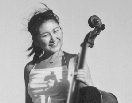
Jing Zhao
Before the winners were announced, a new biography of Emanuel Feuermann by Annette Morreau was introduced. Morreau did her best to speed up the time spent waiting for the winners with lively anecdotes about Feuermann ("Knowing Feuermann, the one who should win is the one who smokes the most and drives cars the fastest..."), but everyone was just eager to hear who had won the prizes. At the end, each winner was called up to the stage and warmly hugged by all the jury members. The joyful mood in the hall and the public's agreement with the jury's decisions confirmed the author's feeling: this new competition was fair and pleasing; the most promising talents received the prizes they deserved.
The prizes were awarded as follows:
-
- Danjulo Ishizaka (Germany): Grand Prix (Euro 25,000)
- Gavriel Lipkind (Israel) received the Special Prize for the best interpretation of the Concerto for Violoncello and Orchestra in D-major by W.A. Mozart (Euro 5,000) and the Special Prize for the best interpretation of Solo II by Aribert Reimann (5.000 Euro)
- Jing Zhao (China) received the Special Prize for Promising Talent, a cello built by Jan van Kouwenhoven exclusively for the competition
- The prize for the best interpretation of a suite by Max Reger went to Danjulo Ishizaka (Euro 5,000)
- In addition, the jury awarded a special prize to honor the recently deceased cellist Zara Nelsova (intended as a member of the jury): Euro 5,000 to Boris Andrianov (Russia)
-- December 2002





